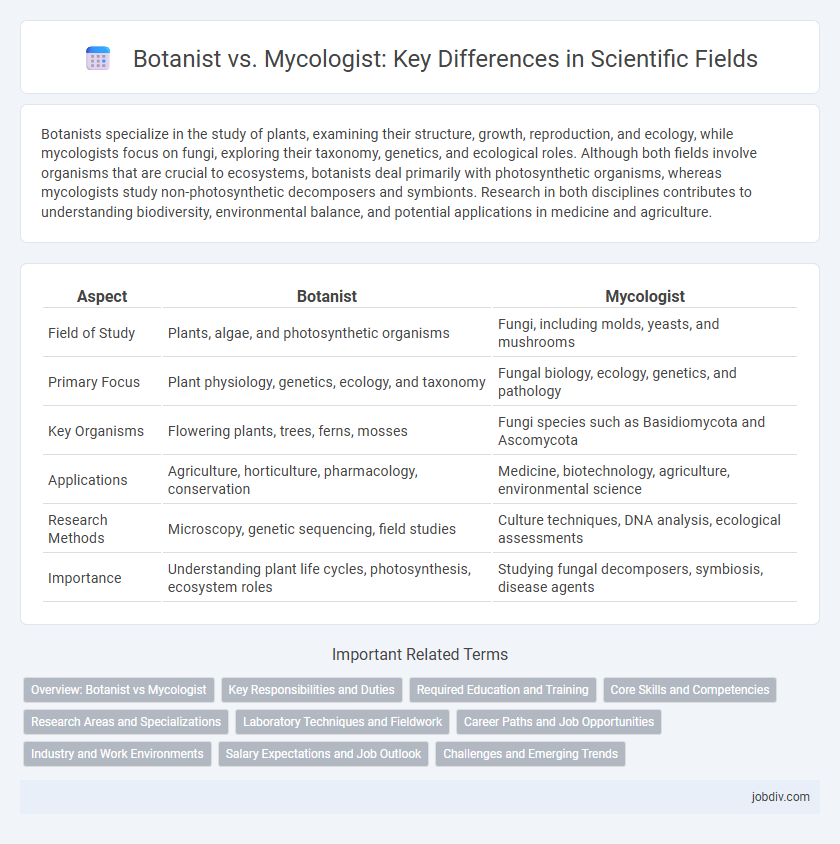Botanists specialize in the study of plants, examining their structure, growth, reproduction, and ecology, while mycologists focus on fungi, exploring their taxonomy, genetics, and ecological roles. Although both fields involve organisms that are crucial to ecosystems, botanists deal primarily with photosynthetic organisms, whereas mycologists study non-photosynthetic decomposers and symbionts. Research in both disciplines contributes to understanding biodiversity, environmental balance, and potential applications in medicine and agriculture.
Table of Comparison
| Aspect | Botanist | Mycologist |
|---|---|---|
| Field of Study | Plants, algae, and photosynthetic organisms | Fungi, including molds, yeasts, and mushrooms |
| Primary Focus | Plant physiology, genetics, ecology, and taxonomy | Fungal biology, ecology, genetics, and pathology |
| Key Organisms | Flowering plants, trees, ferns, mosses | Fungi species such as Basidiomycota and Ascomycota |
| Applications | Agriculture, horticulture, pharmacology, conservation | Medicine, biotechnology, agriculture, environmental science |
| Research Methods | Microscopy, genetic sequencing, field studies | Culture techniques, DNA analysis, ecological assessments |
| Importance | Understanding plant life cycles, photosynthesis, ecosystem roles | Studying fungal decomposers, symbiosis, disease agents |
Overview: Botanist vs Mycologist
Botanists specialize in the study of plants, encompassing their physiology, genetics, ecology, and classification, while mycologists focus on fungi, including mushrooms, molds, and yeast. Both fields involve taxonomy and ecology, but botanists analyze photosynthetic organisms critical to ecosystems and agriculture, whereas mycologists investigate decomposers and symbiotic species vital for nutrient cycling. Understanding these distinctions clarifies their unique contributions to biological sciences and environmental research.
Key Responsibilities and Duties
Botanists primarily study plant physiology, taxonomy, and ecology, focusing on plant growth, reproduction, and interactions within ecosystems. Mycologists investigate fungi, examining their genetics, biochemistry, and role in decomposition and symbiotic relationships. Both scientists contribute to environmental conservation, but botanists emphasize plant species management, while mycologists specialize in fungal biodiversity and pathology.
Required Education and Training
Botanists typically require a bachelor's degree in botany, biology, or plant science, often followed by a master's or Ph.D. for advanced research roles. Mycologists usually pursue similar educational pathways, focusing on mycology, microbiology, or fungal biology, with graduate studies emphasizing fungal taxonomy and ecology. Both fields demand extensive laboratory experience and fieldwork, with specialized training in plant or fungal identification, genetics, and biochemical analysis.
Core Skills and Competencies
Botanists specialize in plant biology, possessing core skills in plant taxonomy, ecology, physiology, and molecular biology techniques essential for understanding plant growth and adaptation. Mycologists focus on fungi, requiring competencies in fungal taxonomy, spore analysis, mycorrhizal relationships, and pathogen identification to study fungal ecology and their roles in ecosystems. Both fields demand strong laboratory skills, data analysis, and proficiency in microscopy to conduct detailed research and experimentation.
Research Areas and Specializations
Botanists specialize in the study of plants, focusing on areas such as plant physiology, ecology, taxonomy, and genetics, examining processes like photosynthesis and plant reproduction. Mycologists concentrate on fungi, investigating fungal biology, pathology, ecology, and their roles in decomposition and symbiotic relationships. Both fields contribute to understanding biodiversity, but botanists emphasize flora, while mycologists target fungal species and their applications in medicine and agriculture.
Laboratory Techniques and Fieldwork
Botanists employ microscopy and plant tissue culture techniques to study cellular structures and physiological processes, while mycologists utilize spore staining, culturing on selective media, and molecular DNA analysis to identify and classify fungi. Fieldwork for botanists often involves systematic vegetation surveys, phenology monitoring, and herbarium specimen collection, whereas mycologists conduct spore trapping, fungal fruiting body documentation, and substrate sampling in diverse ecosystems. Both disciplines require sterile technique and environmental parameter control but diverge in specimen handling due to the fundamental biological differences between plants and fungi.
Career Paths and Job Opportunities
Botanists specialize in plant biology, studying plant physiology, genetics, and ecology, which leads to career opportunities in agriculture, environmental consulting, and pharmaceutical research. Mycologists focus on fungi, exploring their roles in ecosystems, biotechnology, and disease control, with job prospects in food production, medicine, and industrial applications. Both fields offer diverse paths in academic research, governmental agencies, and private industry, but botanists often have broader ecological roles while mycologists provide expertise critical to fungal-related industries.
Industry and Work Environments
Botanists primarily work in agricultural research, environmental consulting, and pharmaceutical industries, focusing on plant biology and crop improvement. Mycologists specialize in industries like biotechnology, food production, and environmental management, analyzing fungi for applications in antibiotics, fermentation, and biodegradation. Both professions operate in laboratories, field research sites, and academic institutions, but mycologists often engage with microbial and industrial-scale fermentation processes more intensively.
Salary Expectations and Job Outlook
Botanists typically earn a median salary around $70,000 annually, with job growth projected at 5% over the next decade, driven by environmental and agricultural research demands. Mycologists have a median salary close to $75,000, reflecting specialized expertise in fungi with applications in pharmaceuticals and biotechnology, with a slightly faster job growth rate of 6%. Both fields offer stable career prospects, but mycology's emerging roles in sustainable industries may provide increased opportunities and higher salary potential.
Challenges and Emerging Trends
Botanists and mycologists face challenges in accurately classifying species due to genetic similarities and environmental adaptations, complicating taxonomic distinctions. Emerging trends include using advanced genomic sequencing and bioinformatics tools to uncover hidden diversity and evolutionary relationships between plants and fungi. Both disciplines are increasingly integrating ecological modeling and climate change studies to predict impacts on species distribution and ecosystem dynamics.
Botanist vs Mycologist Infographic

 jobdiv.com
jobdiv.com